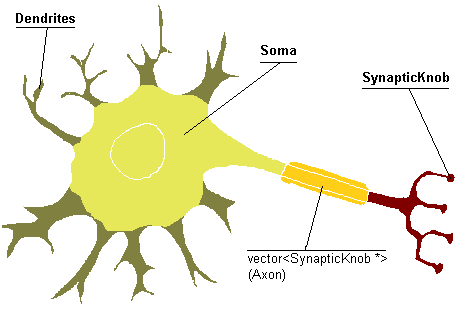[Home]
[Up]
[Presentation]
[Definitions]
[Object Structure]
[Evaluation Procedure]
[Learning Procedure]
[Create Pattern]
|
3. Object
Structure
We will base ourselves on the image of a neuron to associate some objects
and define the key functionalities used in the document. On the below
schema, each colour will have an object representation.
We will partition the neuron into three distinct objects.
 |
- The Soma will have two immediate members: a vector to the
dendrites (input) and a vector to the synaptic knob (axon - output).
The soma will contain two important values:
- threshold: minimum value to generate an action potential
or trigger for a spike.
- value: equivalent to the amount of ions in the cell.
The public actions will be the
- Depolarization(): transfer of the value to the
axon.
- Refractory(): kind of a reset to stabilize the soma.
The relation between the dendrite and the soma will be established
by
- ActionPotential(): Modify the value and verify if
a spike can be sent to the axon
It is possible to enquire/modify the threshold.
|
- The Dendrites will be connected with the soma via a container
(vector). Their tasks is to serve as a filter for the amount of
information to transfer to the soma
- value: is the equivalent of the learning rate. Each transfer
will have its amount multiply by the value.
Only protected action is allowed on the dendrite - friends are the
Neuron and the SynapticKnob
- ReceptorSite() will make the link with the soma, informing a
new quantity of information has arrived.
- Learn() will modify the content of value in order to
fit some requirements.
- SetValue() to assign the learning rate.
The Dendrite has no public member and is therefore totally inaccessible
to the world.
- The SynapticKnob is the mean the soma has to propagate the
information to another neuron.
- value: is the ratio of excitatory neurotransmitters the
information will generate and pass on to the dendrite.
- a pointer to a call back function that will modify the value.
One protected member:
- Depolarization(): the function will apply the value to
the amount of information before transferring it.
Like the dendrite, the object is only accessible from within the
Neuron.
The synaptic knob can be linked with a dendrite (most common case) but
also a Soma allowing to modify the threshold of a neuron or another
synaptic knob. In the latter case, we must explain the behaviour via an
interaction table, knowing the synaptic knob will produce inhibitory or
excitatory neurotransmitters according of the value of the synaptic knob
he is connected with.
| SK 1 |
SK2 |
Transferred |
| 0 |
0 |
0 |
| 1 |
0 |
1 |
| 0 |
1 |
1 |
| 1 |
1 |
0 |
The functionality of this eor is quite easy to understand... The
synaptic knob 1 is connected to the second and will produce excitatory
neurotransmitters if the synaptic knob to which he is connected does not
produce any.
In the below example we may have a better comprehension if the synaptic
knob 1 transfer 0.3 instead of 1.0
| SK1 |
SK2 |
Transferred |
| 0 |
0 |
0 |
| 0.3 |
0 |
0.3 |
| 0 |
1 |
1 |
| 0.3 |
1 |
0.7 |
|